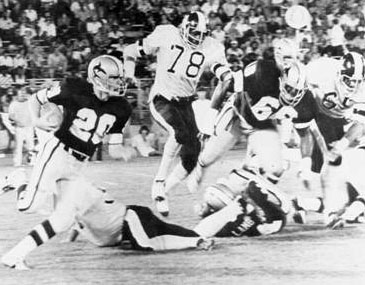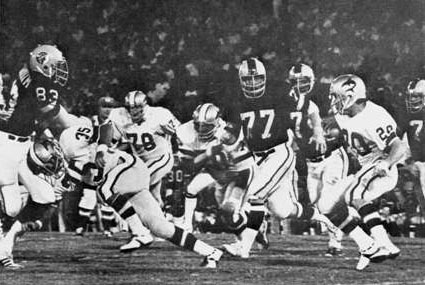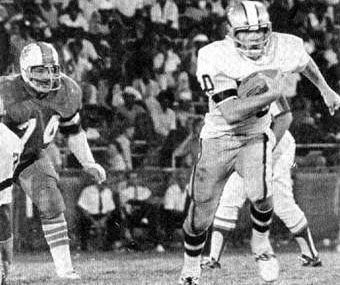


-
WFL

-
1974 Season

-
1975 Season

-
Multimedia


WFL Interviews
The World Football League Web site presents an interview with former Jacksonville Sharks Running Back Tommy Durrance

The WFL Hall of Fame was pleased to have the opportunity to talk to former University of Florida and Jacksonville Sharks running back Tommy Durrance. Tommy Durrance was the leading rusher for the Jacksonville Sharks, and was clearly one of the brightest stars on the young team. Today, Tommy resides in Florida where he is a successful businessman and enjoys playing golf with his sons.
(NOTE: Sadly, Tommy Durrance passed away on July 22, 2005.)
You had a very successful college career at the University of Florida. When did you hear about the WFL, and who contacted you to play for the Sharks?
Bud Asher contacted me regarding the WFL. He was running the Safari Motel here in Daytona Beach- I think he owned the place. I had known Bud for years. I went down there to talk to him and I think I signed a contract that night for $26,000. I'd known Bud throughout my high school years, in pee-wee football, and everything. I had been drafted by the Pittsburgh Steelers in the 14th round and I had gone up to camp- I got $1,500 to report to camp to play with the team. I went up there, and I wasn't really ready to play. I wasn't in shape. We did some small workouts and I didn't have my body, or mind in shape- and you have to be prepared to play in the NFL. So I quit and came home to Florida. When I heard of the WFL I thought, "well, here's my chance...it (football) was still in my blood."
What was it like to sign a professional football contract?
I was very excited to sign with the Jacksonville Sharks and the World Football League. I didn't know much else about the team or the league except Bud Asher was the coach and Fran Monaco was the owner of the team. We went down to Deland, Florida- Stetson University- for training camp, there were a lot of guys there trying to make the team. We had five or six running backs. I thought I wasn't one of the top backs, but, day by day you do the little things well and eventually I thought it would all worked out for me. Everybody else looked better than I did...at least I thought so.
The Sharks had a couple of veteran quarterbacks- Kay Stephenson and John Stofa- did they bring a certain air of leadership to the Sharks?
I had heard of Kay Stephenson, when he played for University of Florida, through talk and such. It was pretty neat playing with him. Kay had played with Buffalo and San Diego of the AFL, and John played for the Bengals and Dolphins. It was an exciting time for me as a young man. I don't remember them coaching the younger players- that was left to the staff. But it was exciting for me to be playing with Kay and John
The WFL ushered in several rule changes. What was your impression of them?
I have to be honest. I didn't pay too much attention to it. Looking back, I just went out and played football. It was great being a member of the Sharks and the WFL. I didn't feel that there was too much pressure to win. I just loved putting on the helmet and playing football. I remember running down the field on special teams during kickoff coverage- I shouldn't have been doin' that- hittin'guys and all...but it was fun.

Tommy Durrance runs for yards against the New York Stars on opening night in Jacksonville.
How would you categorize your running style?
I ran like a full back- slow and hard. I can't really compare myself to anyone. I don't think I compare to anyone. I just lowered my head, and went forward. Do what you gotta do to get the job done! I enjoyed catching passes out of the backfield, and running in the open field. I don't remember how many passes I caught in the WFL, but we ran a couple of plays where I went out for short passes and then cut up field. I had done a lot of that with University of Florida when I played with John Reaves.
(WFLHOF note: Tommy Durrance finished the 1974 WFL season with 658 yards on 218 carries in 14 games. He scored five touchdowns and had 12 receptions for 105 yards.)
The Sharks had played a lot of close games- what are your fondest memories in those early days?
We were living out at Bay Meadows, a small apartment complex in the center of Jacksonville. We would finish practice in the morning and head back to our apartments, take a rest and then head out to the golf courses and tee it up. That wasn't a bad way to work. We had a lot of good times, that's a pretty good day. We never met at night for meetings or practice. We seemed to always work out in the morning, have our meetings, and then break after that. It was great playing football and hanging out with the guys at the course playing a couple of holes.
The Sharks were at the top of the WFL in attendance, did you feel the Jacksonville fans support the team well?
Yes. I felt that Jacksonville was a great football town. That has been proven today with the NFL Jaguars. The fans were good and they supported the team well. We had 30,000 or 40,000 fans a game; they really enjoyed the team and the players. The town didn't have any professional sports teams, and when the WFL came to town the fans went wild.
(WFLHOF note: Sharks owner Fran Monaco was publicly criticized for giving away over 40,000 free tickets to the teams' first two home games. Unreported was the fact that over 15,000 of these tickets went to various youth groups throughout the greater Jacksonville area. When asked about the "freebies"- as the media would dub them later- Monaco replied, "It's my money in this venture. Why shouldn't I give away tickets to the youth of Jacksonville and the parents that accompany them?")
As the WFL season progressed, the league and the Sharks, started to show signs of financial struggle. Were there times when you realized that things were strained?
I remember one game vividly. JFK Stadium, Philadelphia. We played against the Philadelphia Bell at JFK Stadium. We had traveled up there and when we landed at the airport there we walked through the lobby to the outside curb. There were all these school busses lined up to take us to the stadium. So, here we are, grown men, lining up to pile into these school buses. I'm in my seat and I look out the window and over across the parking lot there is Fran Monaco (the Sharks owner) and his whole entourage getting into a couple of big white stretch limousines. We (the Sharks players) hadn't been paid in four or five weeks, and to see them climbing into these big luxury cars...well, some guys didn't take to kindly to that. There were some harsh words. When we got to the stadium (JFK) it was huge. It held over 100,000 fans. We learned that there had been a horse show there the night before, the Royal Lipizzan Stallions, and the field was all torn up and there were big piles of horse manure all over it...and that's how we played the game that night. Running and tackling through all of that. There was probably 3,000 or 4,000 people in the stands and they were all sitting behind our bench. All night long these drunk guys would curse us out and throw beer cans at us- it was something. Fans would come down on to the field, come up behind the bench and steal things and then run back up into the stands. All night long this sort of stuff went on. We ended up tied at the end of the game and went into overtime. The overtime period went on forever- we eventually lost 41-22, and the game ended at about 1 or 2 in the morning. I remember walking off the field that night- I was beat. That made for a very long night.
The media tried to sensationalize the problems in the WFL. I really remember the guys on the Sharks only wanting to be paid for their work. When I signed my contract for $26,000 it was to be divided over the number of weeks in the season, twenty weeks, not the whole year. So after every game I expected to be paid $1,300. Some of the contracts called for payments to be made over the year. In other words, after a game some guys would get 1/52 of their pay. In the WFL, sometimes you played more than one game a week, so usually some one from the front office would come over and hand you a game check and if you played more than one game- hell, we felt like we were millionaires. I think some of the guys spread their pay out over the year, which, unfortunately, turned out to be a bad decision. I didn't spend a whole lot of time worrying about the finances of the league or the Sharks- I just played football.

Tommy Durrance runs against the Hawaiians in a nationally televised game from Jacksonville on August 8, 1974.
After a 2-4 start, head coach Bud Asher was fired by Fran Monaco. What was the mood on the team after Charlie Tate was hired?
I liked Bud Asher. Being from Daytona Beach I knew of him. A lot of people were down on him. The Sharks had lost of couple of close games. I guess the players were glad about the change. Charlie Tate came in, and people liked him, he was a good football guy. I don't remember a lot of bad feelings on the team. We got down to business.
The WFL introduced a Wednesday and Saturday schedule. As a running back, did that frequent a game schedule take a toll on your body?
I don't remember a problem. You are young and can heal a bit easier. The WFL had good caliber of play. It was the 'cream of the crop', better players, better coaches. There were times when you would be a bit sore at times but most of us played through it. If we were really banged up, the coaching staff would take us through light workouts.
Who were some of your teammates that stood out on the Jacksonville Sharks?
Running back, Ricky Lake. He was a close friend of mine. When the Sharks folded, he and his wife moved in with us until they got situated. Ricky was a fullback, straight-ahead type of runner and a good blocker. Quarterback Eddie McAshan was quick and he got us a few wins, but I think he got injured later in the season. Wide receiver Edgar Scott. I see Eddie from time to time. He was a quick receiver- good hands. Quarterbacks Kim Hammond and Kay Stephenson. Kim Hammond is a judge now, and at the time he was a lawyer when he played for the Sharks. Kim was active in representing the team when the money stopped coming in. He would go to management and discuss the situation with them on behalf of the players. On the defense, Ron Coppenbarger- he was good. Glenn Gaspard was also steady- and tough. They were all good guys.
One of the players I remember the most was Jeff Davis.
We had played up in Harlem, at Downing Stadium in New York- against the Stars. That night the Stars knocked out all three of our quarterbacks; Kay Stephenson, John Stofa and Kim Hammond. Hammond was the last one- he went down with a concussion. When the trainer got him off the field we all stood around speechless. On the sidelines, everybody is looking around- it was weird, every quarterback was down- and Davis was saying, "I can play coach, I can play"- and in he goes. It was great. He ran the option all night. Option right, option left, option right- it is the easiest play to run as a running back, you don't need to make a decision as to where to go. Jeff ran out and if there wasn't anything there- he threw it. The Stars were wild. New York couldn't defend against it, they had no idea how to. We drove all the way down the field and with a few minutes remaining, Jeff rolled out and he hit Tony Lomax in the end zone with a pass that we thought was clearly a touchdown. The officials ruled Tony out - we lost the game, 24-16.
When did you find out the Sharks had folded?
We had played a game out in Los Angeles against the Sun. Before the game there was a lot of talk about boycotts and not going on the trip. I remember thinking, "if these guys aren't going to pay us, we shouldn't play, we should go home and go to work." I had a business to go back to but some of the other guys didn't. Many of them were wondering where they would work, and how they would pay their bills and such. We went out there and played, we lost the game, and when we returned I think the guys got one check from the league. Then, I don't remember having a meeting, but I think Charlie Tate told us that the team had folded and it was over. For a while there were rumors that some one would buy the team and run it for the remainder of the season, but eventually we cleaned out our lockers and headed home.
(WFLHOF note: Two potential investors for the team; Dick Butkus and Matson G. O'Neal approached Fran Monaco about buying the team. Butkus, the former Chicago Bear, presented a certified check for $350,000 to the WFL and was turned down by the league. O'Neal, a Miami contractor, and a friend of head coach Charlie Tate, offered to put $100,000 a week into the team. When the WFL tried to convince O'Neal to assume the debts of the Detroit Wheels he balked. O'Neal later told reporters that he wanted a guarantee from WFL commissioner Gary Davidson that he would be paid back his investment if he decided not to buy the team. Davidson refused.)

Tommy Durrance running from Sun DT Dave Roller in week three at Jacksonville
Where you contacted by any teams to join the WFL in 1975?
No I wasn't. It was all for the best. I had gotten football out of my blood by then. I returned to the family business. I still keep in touch with some of the guys though.
In your own words, how would you describe your experience playing in the World Football League?
The WFL was the best time I had playing football. I led the league in rushing for a short while, which is something I'm proud of. I really enjoyed my teammates and playing for the Sharks. The fans were great, and I put the money problems out of my mind. It was a great time to be alive- I enjoyed it.
NOTE: The Tommy Durrance interview was conducted by Jim Cusano. This interview was slated for the former World Football League Hall of Fame Web site, but was never posted. This interview is used with permission and is property of the World Football League Web site and may not be used without the written consent of the Web site owners.
NOTE: The Ron Coppenbarger interview was conducted by Jim Cusano and Richie Franklin. This interview was slated for the World Football League Hall of Fame Web site, but was never posted, and is used with permission. This interview is property of the World Football League Web site, and may not be used without the written permission of the Web site owners.
© Copyright 1996-2007 Robert Phillips, All Rights Reserved